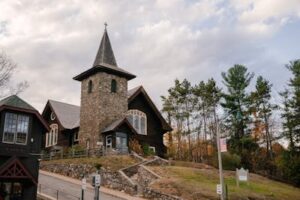Wake Forest University is a private research university located in Winston-Salem, North Carolina. Founded in 1834, the institution has grown into one of the most respected universities in the United States, known for its commitment to academic excellence, student-centered learning, and strong community values. This article delves into the history, academics, campus life, and future vision of Wake Forest University.
A Brief History of Wake Forest University
Early Beginnings in Wake Forest, North Carolina
Wake Forest University was originally established in the town of Wake Forest, North Carolina, in 1834. Initially named the Wake Forest Manual Labor Institute, the school combined manual labor with academic studies, which was a popular educational model in the 19th century. Its mission was rooted in Baptist traditions and focused on training young men for leadership and ministry.
Relocation to Winston-Salem
In 1956, Wake Forest College relocated to its current home in Winston-Salem, North Carolina, thanks to a major financial contribution from the Z. Smith Reynolds Foundation. The move allowed the university to expand its facilities and research capabilities, which contributed significantly to its transformation into a leading academic institution.
Academics and Faculty Excellence
A Broad Range of Academic Programs
Wake Forest University offers a diverse array of undergraduate, graduate, and professional programs across its various schools and colleges, including:
- Wake Forest College (the undergraduate liberal arts college)
- School of Business
- School of Law
- School of Medicine
- Graduate School of Arts and Sciences
- School of Professional Studies
- School of Divinity
These schools collectively offer over 40 majors and 60 minors for undergraduate students, as well as a wide variety of master’s and doctoral programs.
Faculty-Student Engagement
With a student-to-faculty ratio of approximately 10:1, Wake Forest emphasizes small class sizes and personalized learning. The faculty are not only respected scholars in their fields but also deeply invested in mentoring and teaching. This close-knit academic environment fosters collaboration, critical thinking, and lifelong relationships between students and professors.
Campus Life and Community
A Vibrant and Inclusive Student Body
Wake Forest is home to more than 8,000 students from all 50 U.S. states and over 50 countries. The university fosters an inclusive and dynamic campus environment where diversity of thought and background is celebrated. Students actively participate in over 200 clubs, organizations, and honor societies.
Residential Life and Traditions
The university is a residential campus, with most undergraduates living on campus for at least three years. This setup helps foster strong community bonds. Popular traditions include:
- Hit the Bricks: An annual relay race to raise money for cancer research.
- Project Pumpkin: A fall community outreach event for local children.
- Lovefeast: A traditional Moravian Christmas celebration, held each December.
Athletics and Demon Deacons Pride
Wake Forest is a member of the Atlantic Coast Conference (ACC) and competes in NCAA Division I sports. Known as the Demon Deacons, the university’s athletic teams enjoy a loyal fan base and a history of success, particularly in football, basketball, and soccer.
Research and Innovation
A Commitment to Inquiry and Discovery
Wake Forest supports a vibrant research culture, encouraging both faculty and students to pursue groundbreaking research across a variety of disciplines. From neuroscience and bioengineering to entrepreneurship and policy studies, the university funds and facilitates innovative projects that address real-world challenges.
Research Centers and Institutes
Some of the notable research centers include:
- Wake Forest Institute for Regenerative Medicine (WFIRM)
- Center for Energy, Environment, and Sustainability (CEES)
- Center for Bioethics, Health, and Society
These centers offer interdisciplinary opportunities and often collaborate with industry partners and other academic institutions to expand the scope and impact of their work.
Commitment to Ethics and Leadership
The Pro Humanitate Motto
Wake Forest’s motto, “Pro Humanitate” (For Humanity), reflects its dedication to ethical leadership, community service, and social responsibility. The university strives to educate students who are not only intellectually capable but also morally grounded and socially conscious.
Center for Leadership and Character
The university has invested in the development of ethical leadership through programs like the Program for Leadership and Character, which integrates character education into both academic and co-curricular settings. This initiative prepares students to lead with integrity and compassion in their careers and communities.
Admissions and Financial Aid
Selective and Holistic Admissions Process
Wake Forest is known for its selective admissions process. The university takes a holistic approach, considering academic performance, extracurricular involvement, leadership potential, and personal essays. It was also one of the first national universities to adopt a test-optional policy for admissions, a trend many schools have followed.
Financial Support and Scholarships
Wake Forest is committed to making education accessible and offers need-based financial aid as well as merit-based scholarships. Approximately half of undergraduate students receive some form of financial aid, and the university meets 100% of demonstrated financial need.
Alumni Network and Career Development
Successful and Supportive Alumni
Wake Forest has an extensive network of more than 70,000 alumni around the globe. Graduates of the university go on to succeed in a wide range of fields, including business, law, medicine, technology, education, and public service. The alumni community is known for its loyalty and willingness to mentor current students and young graduates.
Career Services and Internship Opportunities
The Office of Personal and Career Development (OPCD) helps students prepare for life after college by offering career counseling, resume workshops, job fairs, and internship placement services. Wake Forest boasts a strong record of job placement and graduate school admissions.
Looking Ahead: The Future of Wake Forest
Strategic Vision for Growth and Excellence
Wake Forest University continues to grow strategically, with a focus on expanding research capabilities, increasing diversity, enhancing sustainability practices, and investing in new technologies. The recent development of Wake Downtown, a satellite campus in the heart of Winston-Salem, represents a commitment to urban engagement and innovation in science and technology education.
Sustainability and Social Impact
The university has set clear sustainability goals, including reducing carbon emissions, improving green infrastructure, and incorporating environmental consciousness into campus culture and curriculum.
Conclusion
Wake Forest University stands as a beacon of academic rigor, ethical leadership, and innovation. With a commitment to community, character, and global engagement, it prepares students to thrive in a rapidly changing world. Whether through its world-class faculty, robust research programs, or strong sense of tradition and community, Wake Forest continues to uphold its mission: “Pro Humanitate.”













